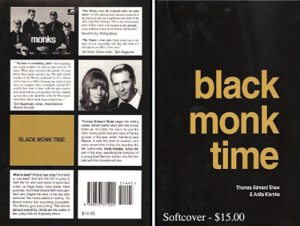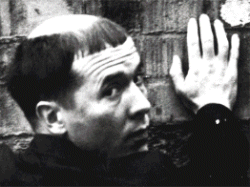“Black Monk Time”
A Memoir by Thomas Edward Shaw & Anita Klemke
Available in soft or hard cover
Purchase
The monks came from a generation of performers who were on stage at least six hours every night. In that situation it doesn’t take long to learn that if everyone hates the performer, the performer is obviously a failure. They also learn that if everyone loves the performer, it’s a sign of failure as well. The ideal situation is when you’re playing and looking out over an audience that isn’t talking about their work, each other, or greeting a long lost acquaintance who just entered the club. It’s perfect when the crowd is staring at the band – and if they’re talking at all, they’re arguing about whether they love the performers or hate them. That’s perfect. Contention (controversy) is the word. And who gives a damn anyway!
A Serious/comic stream of consciousness description of what it’s like to play beat music in Germany as the English were preparing for the English invasion of the American rock music scene. Shortly after the Beatles left Hamburg, singing, “I want to hold your hand,” the monks arrived in the same club screaming, “I hate you, but call me.”
Was it funny? Some didn’t think so. What’s so funny about an anti-beatle? Before they broke up in 1968, the monks claimed, “I’m a monk. You’re a monk. We’re all monks!”
After the breakup, they returned to America, unable to explain who they were or what they had done. Angelika, Eddie’s wife, often found Eddie standing by the bed in their one room apartment, playing air bass guitar and he would be singing, “Higgle-dy Piggle-dy! Way down to Heaven-n-n-jahh!”
It was something a young East German woman would never get used to.
From 1961 to 1966 Germany and Hamburg’s Reeperbahn were the breeding grounds of the world’s popular music. According to Alan Dein, of BBC, Hamburg’s era started with the Beatles and ended with the Anti-beatles. The Monks destroyed it.
“The monks were the original exiles on main street – ex-GI’s playing heavy-attitude freak-rock in the hard-luck bars and roughhouse teen clubs of the ’60’s Cold War Germany. This is the extraordinary story of their weird, wild moment in the spotlight – a true collision of rock and roll history and hysteria.” David Fricke – Rolling Stone
“Shaw’s writing is a joy.”
–Rick Karr, National Public Radio, in interview on “All Things Considered – 6/96
It has become relatively easy to be a rebel. Out rage has become a commodity to be sold. One can make money from it. Those people who call them selves rebels know the commercial viability of their message. It’s their youth and lack of adult concern that makes the message so compelling.
The Monks didn’t know any of this because the defining words of their music had not yet been invented. More than anything, they were rebels without a clue. If they would have been playing thirty years later, one might have called them the anti-punks – maybe the first punks. Marketing && branding was a relatively new subject.
When Eddie returned to the USA and finally finished reading Catch 22, hippies in San Francisco were reading books about transcendental meditation Feeling handicapped by his experience, he tried not to talk about how he had somehow gotten out of step with events that seemed to shape the world at the time. Some people made him feel that they pur posely wanted him to be a victim – as if it would give them an excuse to be one as well.
Years later when Eddie read a newspaper article that stated the number one fantasy of most people was to be a rock star, he finally felt a sense of pride. I did it, he thought. Ain’t that something? Some people don’t want much.

